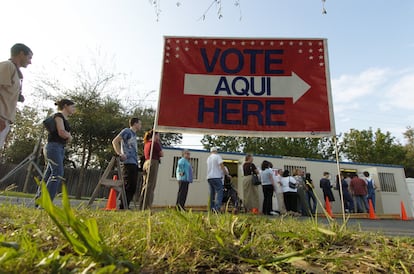Texas raises alarm over ‘illegal voting’ by removing a million people from voter rolls
Experts note that purging ineligible voters who have died or moved is already mandatory, and that portraying this routine procedure as a protection against alleged illegitimate voting only serves to undermine trust in the electoral process

A little over 5% of the names on Texas state voter rolls have been deleted. Governor Greg Abbott announced this week that since he signed a new package of laws in 2021 aimed at restricting voting, more than a million names have been removed from the list of potential voters, including people who moved out of state, those who died, or those whose current address cannot be confirmed, among other reasons. The process, which some critics claim disproportionately affects Latinos and African Americans, is part of the crusade against alleged “illegal voting,” which Republicans accuse non-citizens (with or without legal residency) of doing without providing evidence of the claim. “Illegal voting in Texas will never be tolerated. We will continue to actively safeguard Texans’ sacred right to vote while also aggressively protecting our elections from illegal voting,” Abbott said in the statement announcing the measure.
Several election experts in Texas and nationwide have spoken out, pointing out that regular maintenance of voter registration rolls have been required since the passage of the National Voter Registration Act of 1993. They also warn that portraying this routine procedure as protection against unverified claims of “illegal voting” only serves to undermine trust in the electoral process, which is already fragile due to Donald Trump’s persistent denial of the 2020 election results.
According to data released by the Texas government, of the slightly more than one million voters who were removed from the rolls, 457,000 are deceased, 463,000 were on the suspense list—people who have not voted for two consecutive election cycles—134,000 had moved out of state, 65,000 failed to respond to a notice of examination, 19,000 requested to cancel their voter registration, and 6,000 had a felony conviction. Only 6,500 of the names on the list are non-citizens, and of those, just 1,930 had a “voting history”—that’s .036% and .01% of the state’s registered electorate, respectively—hardly a number that can decide any election. Even so, their records will be sent to prosecutors for investigation and possible legal action against a crime considered serious in Texas since the implementation of the new laws in 2021, even though the “voting history” may correspond to local elections, some of which do grant the right to vote to non-citizens.
Independent election observers have said they want more information about voters who have been removed from the rolls by Texas, as there are recent precedents for errors. For example, a recently naturalized citizen might be removed from the rolls because his or her documents in the database are out of date. The active pursuit of illegitimate voters has been ongoing in Texas since Trump began baselessly repeating claims of widespread voter fraud after the 2016 election, despite winning it. In 2019, state officials singled out 95,000 voters whom they identified as “non-citizens” and accused them of voter fraud. After a review, it turned out that many of those people were naturalized citizens. The scandal forced the secretary of state to resign and, after numerous lawsuits, led to the drafting of new rules for maintaining the rolls.
The American Civil Liberties Union (ACLU) has said that the 2019 experience should mean greater transparency from Texas, but the data provided this week lacks context. And while it hints, in line with the message of the Republican Party and related media nationwide, at illegal voting by immigrants without citizenship, it does not provide any example of a case where this has happened. In fact, there is virtually no evidence of this practice in any instance, and election observers agree that it is highly unlikely that an immigrant would risk possible deportation over a single vote.
Abbott’s announcement comes amid recent activity by state prosecutors against Latino pro-voting organizations and other political organizers as part of an investigation into voter fraud. House searches of Democratic supporters and activists from Lulac, one of the oldest Hispanic organizations in the United States, prompted the organization to accuse Attorney General Ken Paxton of criminalizing Hispanic voters and to appeal to the federal government. In response to these moves in Texas and other red states, voting rights advocates are stepping up their training to counter intimidation by prosecutors in the run-up to the election.
According to Paxton, volunteers from non-profits like Lulac help register voters outside Department of Motor Vehicle offices where driver’s licenses are processed. “If legally eligible citizens can legally register to vote inside these state offices, why are they being offered a second chance at a booth outside?” the attorney general asked. Paxton claims that the Biden-Harris administration has “intentionally flooded” the country with foreigners and that, without oversight, they “could illegally influence the election.” There is no evidence to support these claims.
The emphasis on voter fraud has its roots in Reconstruction-era efforts after the American Civil War to suppress the votes of newly freed enslaved people and was revived after passage of the Voting Rights Act in 1965. But former President Donald J. Trump’s insistent claims about illegal voting in recent years has given it new prominence. Since then, Texas and several other states have moved to establish “election integrity” units, to purge voters from their rolls and pass laws restricting how and when people can vote. Alarm bells are ringing and trust in elections is eroding, even though widespread fraud remains to be seen.
Sign up for our weekly newsletter to get more English-language news coverage from EL PAÍS USA Edition
Tu suscripción se está usando en otro dispositivo
¿Quieres añadir otro usuario a tu suscripción?
Si continúas leyendo en este dispositivo, no se podrá leer en el otro.
FlechaTu suscripción se está usando en otro dispositivo y solo puedes acceder a EL PAÍS desde un dispositivo a la vez.
Si quieres compartir tu cuenta, cambia tu suscripción a la modalidad Premium, así podrás añadir otro usuario. Cada uno accederá con su propia cuenta de email, lo que os permitirá personalizar vuestra experiencia en EL PAÍS.
¿Tienes una suscripción de empresa? Accede aquí para contratar más cuentas.
En el caso de no saber quién está usando tu cuenta, te recomendamos cambiar tu contraseña aquí.
Si decides continuar compartiendo tu cuenta, este mensaje se mostrará en tu dispositivo y en el de la otra persona que está usando tu cuenta de forma indefinida, afectando a tu experiencia de lectura. Puedes consultar aquí los términos y condiciones de la suscripción digital.









































